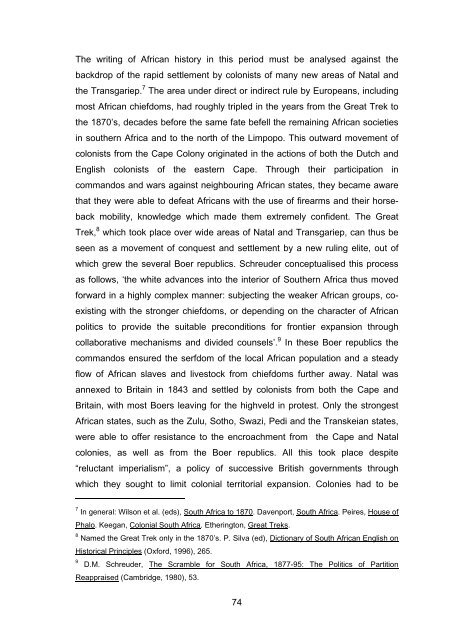The Historiographical Development of the Concept “mfecane” and ...
The Historiographical Development of the Concept “mfecane” and ...
The Historiographical Development of the Concept “mfecane” and ...
You also want an ePaper? Increase the reach of your titles
YUMPU automatically turns print PDFs into web optimized ePapers that Google loves.
<strong>The</strong> writing <strong>of</strong> African history in this period must be analysed against <strong>the</strong><br />
backdrop <strong>of</strong> <strong>the</strong> rapid settlement by colonists <strong>of</strong> many new areas <strong>of</strong> Natal <strong>and</strong><br />
<strong>the</strong> Transgariep. 7 <strong>The</strong> area under direct or indirect rule by Europeans, including<br />
most African chiefdoms, had roughly tripled in <strong>the</strong> years from <strong>the</strong> Great Trek to<br />
<strong>the</strong> 1870’s, decades before <strong>the</strong> same fate befell <strong>the</strong> remaining African societies<br />
in sou<strong>the</strong>rn Africa <strong>and</strong> to <strong>the</strong> north <strong>of</strong> <strong>the</strong> Limpopo. This outward movement <strong>of</strong><br />
colonists from <strong>the</strong> Cape Colony originated in <strong>the</strong> actions <strong>of</strong> both <strong>the</strong> Dutch <strong>and</strong><br />
English colonists <strong>of</strong> <strong>the</strong> eastern Cape. Through <strong>the</strong>ir participation in<br />
comm<strong>and</strong>os <strong>and</strong> wars against neighbouring African states, <strong>the</strong>y became aware<br />
that <strong>the</strong>y were able to defeat Africans with <strong>the</strong> use <strong>of</strong> firearms <strong>and</strong> <strong>the</strong>ir horse-<br />
back mobility, knowledge which made <strong>the</strong>m extremely confident. <strong>The</strong> Great<br />
Trek, 8 which took place over wide areas <strong>of</strong> Natal <strong>and</strong> Transgariep, can thus be<br />
seen as a movement <strong>of</strong> conquest <strong>and</strong> settlement by a new ruling elite, out <strong>of</strong><br />
which grew <strong>the</strong> several Boer republics. Schreuder conceptualised this process<br />
as follows, ‘<strong>the</strong> white advances into <strong>the</strong> interior <strong>of</strong> Sou<strong>the</strong>rn Africa thus moved<br />
forward in a highly complex manner: subjecting <strong>the</strong> weaker African groups, co-<br />
existing with <strong>the</strong> stronger chiefdoms, or depending on <strong>the</strong> character <strong>of</strong> African<br />
politics to provide <strong>the</strong> suitable preconditions for frontier expansion through<br />
collaborative mechanisms <strong>and</strong> divided counsels’. 9 In <strong>the</strong>se Boer republics <strong>the</strong><br />
comm<strong>and</strong>os ensured <strong>the</strong> serfdom <strong>of</strong> <strong>the</strong> local African population <strong>and</strong> a steady<br />
flow <strong>of</strong> African slaves <strong>and</strong> livestock from chiefdoms fur<strong>the</strong>r away. Natal was<br />
annexed to Britain in 1843 <strong>and</strong> settled by colonists from both <strong>the</strong> Cape <strong>and</strong><br />
Britain, with most Boers leaving for <strong>the</strong> highveld in protest. Only <strong>the</strong> strongest<br />
African states, such as <strong>the</strong> Zulu, Sotho, Swazi, Pedi <strong>and</strong> <strong>the</strong> Transkeian states,<br />
were able to <strong>of</strong>fer resistance to <strong>the</strong> encroachment from <strong>the</strong> Cape <strong>and</strong> Natal<br />
colonies, as well as from <strong>the</strong> Boer republics. All this took place despite<br />
“reluctant imperialism”, a policy <strong>of</strong> successive British governments through<br />
which <strong>the</strong>y sought to limit colonial territorial expansion. Colonies had to be<br />
7 In general: Wilson et al. (eds), South Africa to 1870. Davenport, South Africa. Peires, House <strong>of</strong><br />
Phalo. Keegan, Colonial South Africa. E<strong>the</strong>rington, Great Treks.<br />
8 Named <strong>the</strong> Great Trek only in <strong>the</strong> 1870’s. P. Silva (ed), Dictionary <strong>of</strong> South African English on<br />
Historical Principles (Oxford, 1996), 265.<br />
9 D.M. Schreuder, <strong>The</strong> Scramble for South Africa, 1877-95: <strong>The</strong> Politics <strong>of</strong> Partition<br />
Reappraised (Cambridge, 1980), 53.<br />
74

















